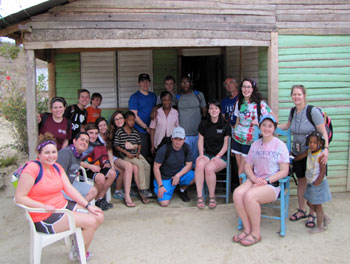
PHOTO GALLERY: View the photos on Facebook
Longwood’s Alternative Spring Break program joined recently with Study Abroad to take students to the Dominican Republic.
Fourteen students, one of whom is a graduate student, participated in an alternative spring break trip led by Dr. Melanie Marks, professor of economics and the study-abroad coordinator. They traveled with the New Community Project, an educational and advocacy organization devoted to environmental issues and human justice concerns. Most of the week was spent in La Guama, a community near the border with Haiti.
"We were there to live with the families and get to know the daily life of somebody who is below the average income level in the Dominican," said Marks. "It wasn’t the poorest community, but there was no indoor plumbing, and the electricity rotated throughout the community."
In La Guama, students worked with a women’s cooperative that made nutritional bars with high calories for malnourished children in the country. Students helped crush peanuts and process oranges that were used to make homemade peanut butter and orange marmalade that the cooperative sold to raise money for the program.
Marks and the students also helped the nearby village of El Cercado to create a community garden that will rotate among households each growing season. "Every process that we saw, that we were involved in, would have not been how we would do things here," said Marks. "Students used a plow pulled by oxen to prepare the land for planting."
Students socialized with the local children, playing baseball with balls made from rags and bats carved from branches. The community also threw a celebratory dance their last night in La Guama. "Any time Dominicans get together, there’s a lot of dancing and baseball," said Marks.
They also visited the Centro de Atención Jesús Peregrino, an organization dedicated to fighting for the rights of the stateless Dominicans who work in the sugar fields. They toured the facilities and the housing, called a batey, most of which were run-down with rusted-through roofs and dirt floors. The group stayed over in one batey where they hosted a community lunch, enjoyed playing sports and swimming in the river with the children, and then slept on the floor of a church. Marks said it was one of the worst nights of sleep she has ever had.
At the end of each day, Marks talked with the students about what they saw and their experiences during that day’s activities. For most, it was the first time they had lived without running water or woken up with livestock right outside their window.
"I think one thing the students took away was that the community structure is so much different from at home," said Marks, who recalls kids running in and out of all the homes. "You could never tell which child was from which family, as every household helped to take care of them. While La Guama is far below the socio-economic status of our neighborhoods, it has a much higher sense of community."
Marks, who has been on more than 10 study-abroad trips, enjoys traveling in the developing world and preparing students for unusual circumstances that can occur when they leave the beaten path. She also likes students to live in the communities, as opposed to just visiting. "It says we care about you and we’re not above being in your community. We want to be part of your community, not just come to take pictures and go."
Marks plans to return to the Dominican next year to continue working on projects and helping with fundraising. "I hope this becomes a sustainable program in which we really make a meaningful connection," she said. "It’s not about the stuff we bring to them but the relationships that we build."

